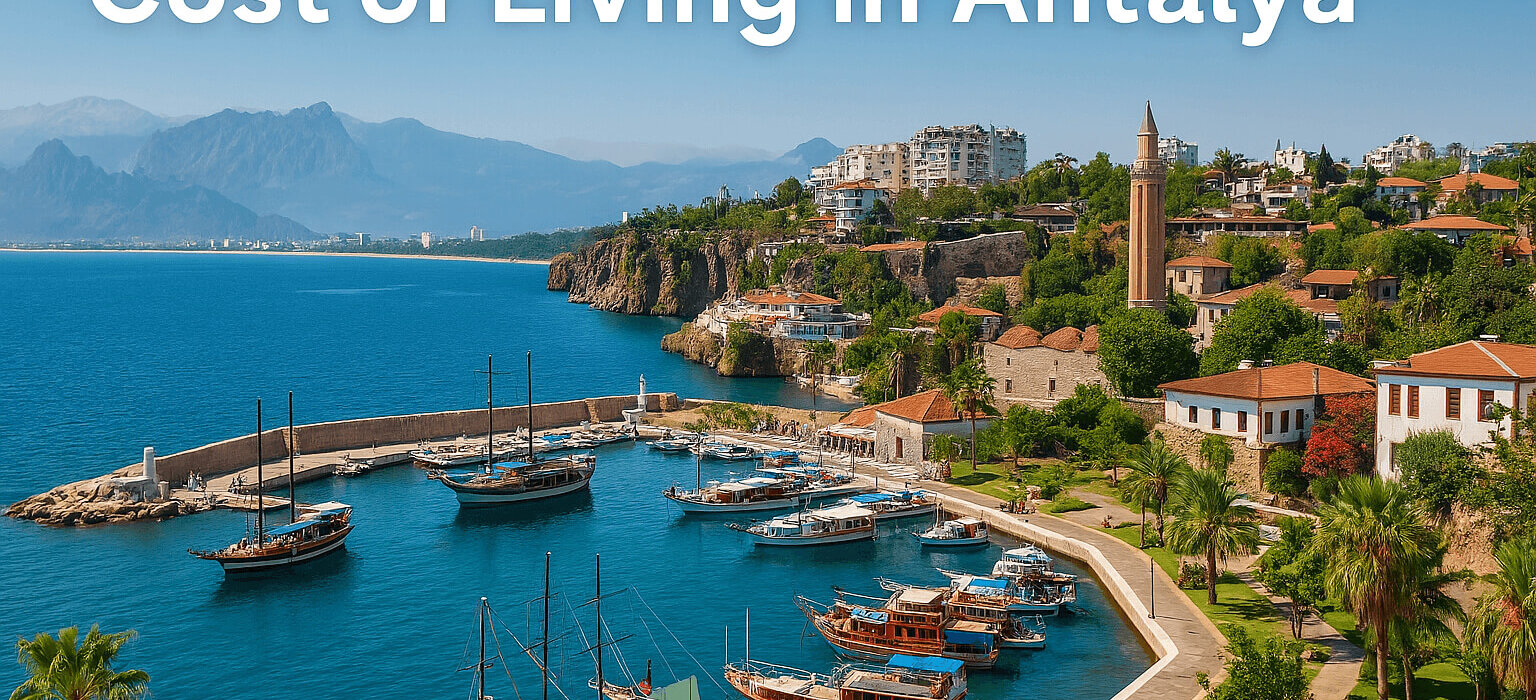Imagine enjoying Mediterranean sunshine while spending 63% less on rent than you would in Barcelona. That’s the reality for expats choosing Antalya, where a couple can live comfortably for under €1,000 monthly. Having worked here since 2006, I’ve helped countless clients discover how far their money stretches in this coastal paradise.
Table Of Content
- Key Takeaways
- Exploring a Comfortable Lifestyle in Antalya
- Housing and Utilities Breakdown
- Grocery Shopping and Dining Out
- Leisure, Healthcare and Savings
- Understanding the average cost of living in antalya
- Monthly Budget Insights for Couples
- Essential Expenses and Utility Costs
- Comparing Antalya’s Living Costs with Other European Destinations
- Price Comparisons: Spain, Italy, and France
- Real-Life Savings and Client Experiences
- Conclusion
- FAQ
- How does Antalya’s cost of living compare to coastal cities like Barcelona or Marseille?
- What’s the average rent for a one-bedroom flat in central Antalya?
- Are utility bills expensive for expats living in Antalya?
- How much should I budget for monthly groceries as a single person?
- Is public transport affordable compared to private options like taxis?
- What childcare expenses should families anticipate in Antalya?
- Can you live comfortably on €1,500 per month in Antalya?
Let’s break it down. A spacious two-bedroom flat near the Old Town typically costs €300-400 per month – less than a studio in most European capitals. Add €100 for utilities, €200 for groceries, and €150 for dining out, and you’ll still have room for leisure. Public transport? A monthly pass is just €25.
What truly surprises newcomers is the quality you get for these prices. Modern apartments often come with pools and gyms included. Weekly markets burst with fresh produce at local-friendly rates, while seafood feasts by the harbour rarely exceed €15 per person.
This affordability doesn’t mean sacrificing lifestyle. Antalya blends ancient history with vibrant nightlife, all framed by turquoise waters. For investors, it’s a gateway to Turkey’s citizenship programme through property. For retirees and digital nomads, it’s a chance to prioritise experiences over expenses.
Key Takeaways
- Couples can manage monthly expenses comfortably within a €1,000 budget
- Two-bedroom rentals start at €300 in central locations
- Utility bills average 25% lower than EU counterparts
- Fresh local produce keeps grocery costs manageable
- Efficient public transport reduces reliance on private vehicles
- Leisure activities remain accessible on a modest income
Exploring a Comfortable Lifestyle in Antalya
Living comfortably here means balancing modern conveniences with smart spending. Let’s examine how residents enjoy quality housing, fresh markets, and vibrant social scenes without financial strain.
Housing and Utilities Breakdown
A two-bedroom flat in central neighbourhoods like Konyaaltı rents for €300-400 monthly – often including access to pools or fitness centres. Utility bills (electricity, water, rubbish) average €100-150, even with air conditioning during summer. Winter heating costs drop significantly thanks to energy-efficient buildings and mild Mediterranean winters.
Grocery Shopping and Dining Out
Weekly markets sell seasonal produce at local-friendly rates: think €1.50/kg for tomatoes or €2 for 1kg of oranges. Supermarkets offer familiar brands, but savvy shoppers save 30% by choosing Turkish alternatives. Dining out remains accessible, with meze platters and grilled seafood meals costing €8-12 at family-run restaurants. Fancy a casual drink? A pint of domestic beer hovers around €2.50.
Leisure, Healthcare and Savings
Leather shoes from local artisans start at €35, while a pair of trainers averages €50 in shopping centres. Enjoying a glass of Turkish wine at a seaside bar costs €3-4. Many expats praise Antalya’s healthcare system – a routine GP visit costs €25-40 without insurance. With efficient public transport, most residents find car ownership unnecessary, freeing up budgets for coastal adventures.
Understanding the average cost of living in antalya
Creating a realistic budget here starts with knowing where your lira stretches furthest. Over 15 years helping families relocate, I’ve found couples thrive when they balance fixed costs with flexible spending.
Monthly Budget Insights for Couples
Most partners I work with manage comfortably on €1,100-€1,300 monthly. Here’s how that breaks down:
- Housing: €300-€400 for a modern 2-bed flat
- Utilities: €80-€100 (including 500kWh electricity and 15m³ water)
- Groceries: €200 at markets like Migros or Şok
- Transport: €40 for two monthly tram passes (€0.40 per ticket)
- Leisure: €150 for 6-8 restaurant meals (€12-€18 per dinner)
Essential Expenses and Utility Costs
Antalya’s infrastructure keeps bills manageable. A typical couple uses:
- Electricity: €35 monthly (summer AC usage included)
- Water: €8 for 10m³ supply
- Mobile data: €7.50 for 20GB monthly plans
Petrol costs €1.25 per litre (£5.60 per gallon), but most residents rely on trams. Taxis charge €0.40 per mile – useful for late nights, though I recommend walking through the Old Town’s car-free zones.
Comparing Antalya’s Living Costs with Other European Destinations
What if your monthly budget could cover both seaside living and European travel? Clients often tell me their Antalya savings fund exactly that. Let’s examine how this coastal city stacks up against popular mainland destinations using April 2025 data.
Price Comparisons: Spain, Italy, and France
A lifestyle costing €1,000 here requires €2,500+ in Barcelona or Milan – and over €3,000 near Nice. The gap widens with housing:
- 2-bed city centre flats: €380 vs. €1,200+
- Weekly groceries: €45 vs. €85-€110
- Dinner for two: €22 vs. €50-€70
Energy bills show similar patterns. My clients’ summer electricity costs run 55% lower than in Seville, despite comparable cooling needs.
Real-Life Savings and Client Experiences
One couple from Hamburg saved €18,000 in their first year – enough for a lakeside holiday home visit and Istanbul weekends. “We’re living better here than in Germany,” they shared recently. “Our rent alone saves €900 monthly.”
Investors particularly benefit. Property taxes here average 0.1% versus 0.4-1.1% in French cities. Combine that with Turkey’s citizenship programme, and it’s no wonder 60% of my clients now come from EU countries.
Updated figures from April 2025 confirm these trends hold strong. As Mediterranean business hubs grow, Antalya’s value proposition keeps attracting savvy expats.
Conclusion
Antalya’s blend of Mediterranean charm and smart spending potential makes it a standout choice for savvy expats. My clients consistently find their budgets stretch further here than in Western Europe – think €300-400 monthly for a two-bedroom apartment near vibrant districts, with transport costs 75% lower than UK averages. A local beer? Just €2.50. Quality leather shoes? From €35.
Recent data shows couples enjoy full lifestyles on €1,000-€1,300 monthly. That includes fresh market groceries, dining out weekly, and tram passes at €0.40 per ride. Compare this to needing €2,500+ for similar comfort in Barcelona or Milan, and the value becomes undeniable.
Having guided over 200 investors since 2006, I’ve seen firsthand how Antalya’s property market delivers both lifestyle perks and financial gains. Whether you’re eyeing citizenship opportunities or simply prioritising sunny living without overspending, this coastal gem deserves your attention.
Ready to explore your options? Let’s discuss how Antalya’s affordable living can work for your goals. Contact me directly for personalised advice rooted in 18 years of Turkish real estate expertise.
FAQ
How does Antalya’s cost of living compare to coastal cities like Barcelona or Marseille?
You’ll spend roughly 40% less here than in those Mediterranean hotspots. A three-course meal for two costs around €35 in Antalya versus €60+ in Barcelona. I’ve helped French clients cut their monthly budgets by €800-1,200 after relocating.
What’s the average rent for a one-bedroom flat in central Antalya?
Expect €350-500 monthly for modern flats near Konyaaltı Beach. Luxury complexes like Ata Villas or Meltem Residence offer pools and sea views for €600-900. Always check if management fees (€20-50/month) are included.
Are utility bills expensive for expats living in Antalya?
A 85m² flat averages €85 monthly for electricity, water, and gas. Winter heating (December-February) adds €50-70 using city-run systems. Many complexes now include solar panels – I recently saved a German couple €160/year through this upgrade.
How much should I budget for monthly groceries as a single person?
€180-220 covers essentials at chains like Migros or Şok. Local markets slash produce costs – 1kg tomatoes cost €0.60 at Cumhuriyet Market versus €1.20 at CarrefourSA. Seasonal fruit prices drop 30-50% in summer.
Is public transport affordable compared to private options like taxis?
Absolutely. A tram ticket costs €0.50 versus €4.50 taxi minimum fare. The AntalyaKart travel pass (€22/month) gives unlimited access to buses, trams, and ferries. For airport transfers, I recommend Havataş shuttles at €3 instead of €25 taxi rides.
What childcare expenses should families anticipate in Antalya?
International preschools like TED College cost €300-450/month. Local municipal crèches charge €120-180. After-school programmes at Antalya Sports Club run €60-90 monthly. Nanny shares average €7/hour – 35% cheaper than Istanbul.
Can you live comfortably on €1,500 per month in Antalya?
Yes, if you’re rent-conscious. My British clients manage with €600 rent, €300 groceries, €150 leisure, and €150 transport. Splurging? €2,500/month allows private healthcare (€75 GP visits), yacht club memberships (€120/month), and weekly fine dining.







[…] treatments. Specialized care for complex conditions is readily available in neighborhoods like İstanbul Şişli Property, home to many premier medical facilities. Antalya provides excellent general healthcare through […]